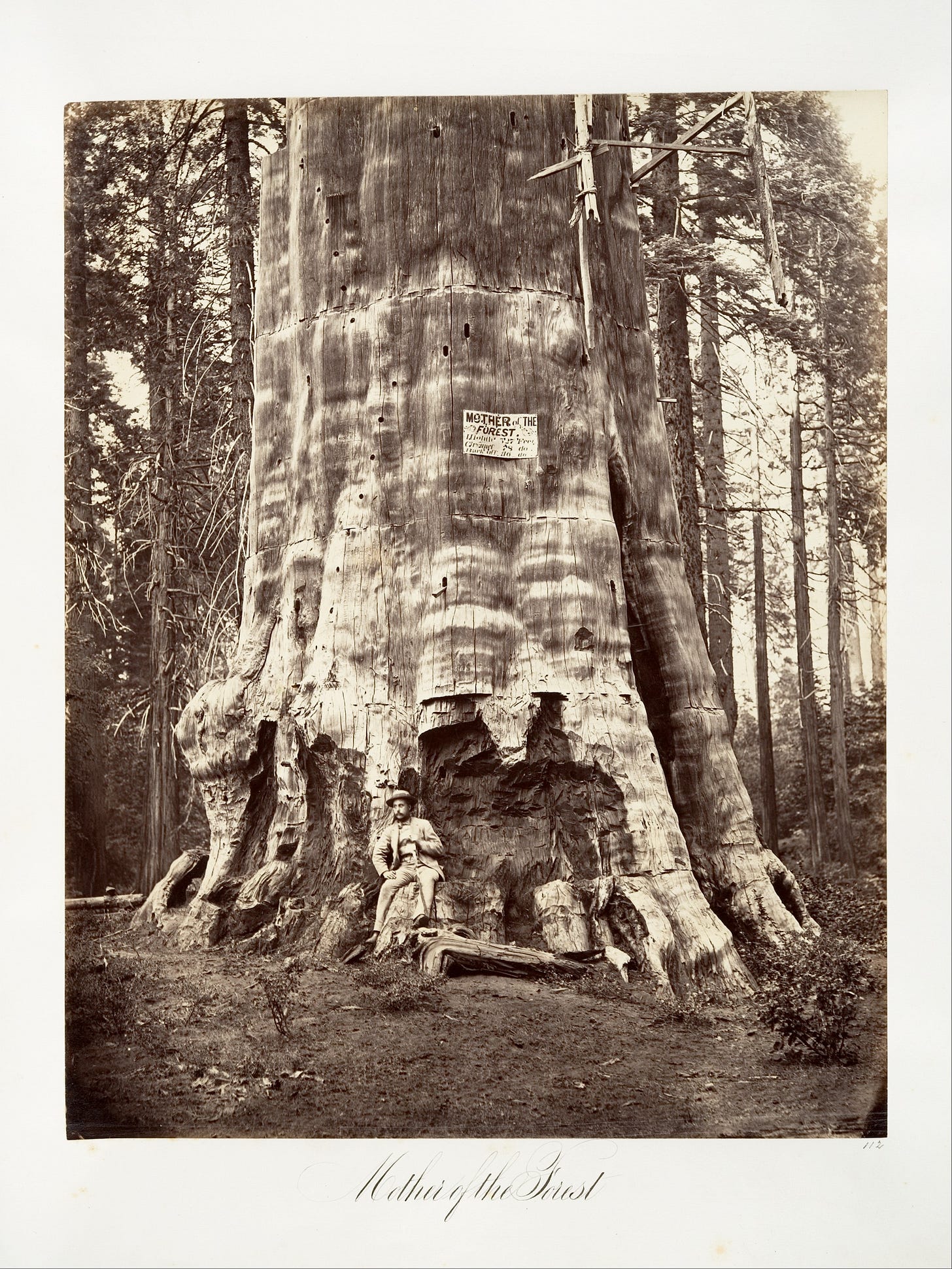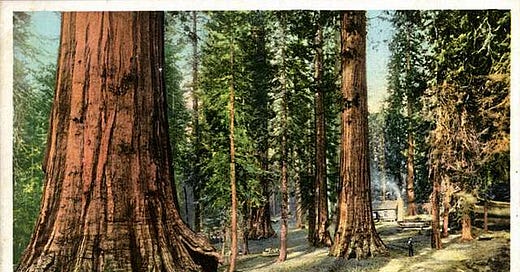Big Tree Agnostic
In spite of the climactic fires—flickering across the screens like a Netflix Yule Log—“Redwood” left me rather cold.
Ask not what you can do for the trees, but what the trees can do for you.
That was my takeaway from “Redwood,” the new musical starring Idina Menzel, now playing on Broadway at the Nederlander Theater.
“Redwood” is about Jesse (Menzel), a New Yorker mourning the unexpected loss of her 23-year-old son, who finds herself in the days leading up to the one-year anniversary of his death on a feverish cross-country road trip, fleeing her job and her loving wife, Mel (De’Adre Aziza), who is processing her grief in her own way.
Jesse is quickly revealed to be the opposite of outdoorsy: “I hate greenery,” she declares. “If I even think about grass, I get Lyme Disease.” And yet, she ends up in a redwood forest in California, where she is discovered trying to sleep among the trees by two scientists, Finn (Michael Park) and Becca (Khaila Wilcoxon). Jesse gloms onto the pair, and badgers them until they let her climb the tree they’re studying, No. 237, and eventually allow her to sleep on the platform in the canopy.
After a tumultuous night in which Jesse faces fires both literal and metaphorical, she realizes she is ready to rejoin her community (wife) and begin healing from their grief, together.
Asked while leaving the theater what I thought, I said my opinions were “mixed.” My friends all looked at me like I was crazy and uniformly declared it the worst Broadway show they had ever seen. But I found it difficult to separate the show I saw from the one I had hoped to see.
I knew that the creators (Tina Landau and Menzel) had been inspired by Julia Butterfly Hill, the activist who lived in an ancient, 200-foot tall California redwood tree for 738 days in the 1990s to stop a lumber company from cutting it down. I remember learning about Hill as a child and being terribly impressed, wishing I could follow in her path.
I also knew it was an original musical (rare) that was also about nature and the environment (even rarer), but that was about it! I could have read reviews in advance and would have had a better idea of what to expect, but I wanted to approach it with a clean slate.

While she may have been the seed of the idea, there was very little of Julia Hill in “Redwood.” In a scene in a lonely hotel room, we see Jesse’s phone screen (enlarged and projected behind her) fill with an informational video about Hill’s feat, part of Jesse’s self-directed tree-climbing crash course. Persistent calls from Jesse’s wife back in the city repeatedly interrupt and eventually cut the video off entirely.
Landau and Menzel seem to have approached what Hill did as an aberration, something that could only be motivated and explained by some horrific personal trauma1 rather than by a higher purpose or cause.
“We knew we wanted to stay with the singular image of a woman in a tree,” Landau told Broadway News in 2024. “We were asking [ourselves]: What would cause someone to do that? And what would you find there, and why would you go there? What would you be running away from or towards?”
So they took the germ of Hill’s action—the tree sitting—and discarded her idealism, self-sacrifice, commitment, determination, and patience, not to mention the actual conflict (drama!) with the logging company, which embodies the sheer force and violence of capitalism.
The story they ended up writing is a self-centered one, in spite of the saccharine lyrics about redwood trees holding each other up through a vast network of shallow but interconnecting roots, which is used to underscore the importance of human connection. (Trees! They’re just like us.)
It’s all about what the tree can do for Jesse; what the scientists can teach Jesse; how can Jesse find peace; how can Jesse heal from this horrible thing. The scientist characters are reduced to little more than props to move Jesse along her inevitable path: Finn the older, sentimental softy who also lost someone and is overeager to help people heal; and Becca the tough, prickly Black woman who (reasonably!) wants to follow safety rules and protocols, and provides what passes for “obstacles” or “friction” along Jesse’s grief journey.
Becca’s character is also unfortunately shouldered with the burden of being the musical’s woke-enforcer, chiding hippie-dippie Finn for referring to Jesse and Becca as “guys” and “girls” until he finally lands on “people,” and explaining that “95 percent of California’s old-growth forests were cut down so generations of white cis male corporations could make their billions off Indigenous land,”2 which, while accurate, felt like it was fulfilling a white feminist checklist before the musical could proceed with what it was most interested in: the white female main character.
Current threats to redwood forests are virtually ignored. The musical emphasizes the fact that redwood trees need fires to germinate (fire helps dry the cones out so they release their seeds). But it fails to mention that wildfires are burning hotter and faster, mostly due to climate change, and are, in fact, killing redwood trees in large numbers.
Perhaps most irksome is that the musical mocks that which I thought it wanted to celebrate. Before leaving the forest for good, Jesse throws her arms around “Stella” (the name the tree apparently offers during Jesse’s first night on the platform, and likely a coy nod to the tree Hill lived in for years, which was called “Luna”). “I’ve become my worst nightmare,” Jesse sighs. “A tree-hugger.”
Why is that the punchline of the musical? ‘Haha, ew, tree-huggers,’ really?
There were some things I liked, or at least didn’t hate. I enjoyed the song “Big Tree Religion,” which was probably the catchiest and most upbeat of the bunch. I had mixed feelings about the heavy reliance on LED screens. They could be at times immersive, at times blindingly obtrusive. And, of course, it’s fun to see a Broadway icon like Menzel perform live—even if she sounded a bit hoarse. (Others have catalogued what a heavy lift the show is for the star.)
But in spite of the climactic fires—flickering across the screens like a Netflix Yule Log—“Redwood” left me rather cold.
To be fair, a perusal of Hill’s Wikipedia page reveals that she was in fact recovering from a traumatic experience—a near fatal car crash—shortly before she ascended Luna.
Thanks to the New York Times’ Jesse Green for getting that down because I couldn’t have quoted or fairly paraphrased from memory.





Good to know about Hill. I wonder if anyone has written a book about her? I wish someone would produce a play for children based on her story, with a satisfyingly nasty gang of baddies and such an inspiring lone heroine, perhaps beginning with her terrible car crash. Much better than that awful musical.
Helpful to see this POV! I had red flags about this musical and will probably avoid as a result.